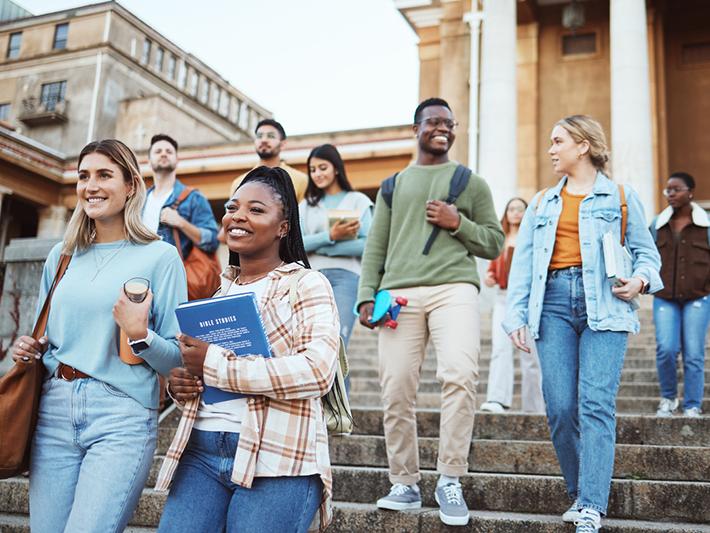
What makes a good university taster event?

With more than 150 higher education providers in the UK, the sector is highly competitive. Faculties need to work to ensure that students in post-compulsory education who study their subject at an introductory level – through A level or vocational diploma – choose to further their studies in that discipline, and decide to do so at their institution.
Taster events can be a major part in students’ decision to progress in a particular subject. These opportunities go beyond the broad institution or student life open day format into curriculum-specific aspects, where higher education staff and others from relevant faculty give visiting students an informative experience regarding the course and organisation concerned.
- Campus webinar: Build a successful student recruitment strategy
- Using the Snowflake Method to build belonging on campus
- Actions to help your university stand out in a crowd
Here, we outline key components and themes that make a successful taster event.
Highlight learning continuity and difference
Students pursuing relevant post-compulsory courses need to see some familiarity in the further study available at your institution, so your taster should make clear the value of their current learning and demonstrate the achievability of the next level.
At the same time, an effective taster will introduce new content. Students need to have confidence in the value added in the further course of study. So, faculty delivering the taster must be familiar with the A level or vocational diploma curricula/specification in their subject so they can show students why their prior learning counts and how treatment at degree level will add to it.
Demonstrate your course’s real-world applications
In line with the value-added aspect, tasters and progression events should show the real-world applications of the course. While not all faculties can boast consultancy experience with industry, government or the arts, gentle illustrations on how the further learning can be applied to recognised examples in a sense-making or problem-solving way should increase the programme’s appeal. In such cases, focus on high-profile or big-canvas case studies to make the link clear.
In some respects, for both vocational and academic programmes, linking to coverage in the popular media may demonstrate relevance, though practitioners or faculty may wish to temper any glamorisation attached, as may occur for subjects such as criminology or history of art (through television programmes such as True Crime or the BBC’s Fake or Fortune).
Include opportunities for participation
Where a taster extends beyond the briefest whistle-stop coverage, the session should be engaging and offer relevant activities for the potential students to do that reinforce achievability, continuity/difference and the real-world application. Key aspects regarding such activities are the right pitching and the provision of encouraging feedback on what the students accomplish.
Activities could involve scenario tasks, where subject models linked to existing student understanding are extended and applied, for example, to a video scenario with students noting down and then feeding back on the model’s applicability.
Remember that the audience is level 3 students, so even if they have a strong interest in further study, task design may need to include scaffolding if the activities relate directly to understanding of degree material. Part-worked examples regarding model-application tasks could work as scaffolding for these activities. However, a lengthy tutor-centred talk – even one with impressive visuals – may seem stale and potential students might then associate that impression with the institution or course.
A final point here is that activities may showcase the value of your institution or department’s facilities, for example, the provision of interactive IT.
Involve undergraduate students in the taster event
Involvement of willing undergraduates in a taster event can offer potential students a chance to interact with members of the university. This may well increase a sense of inclusion and potential belonging far more than anything the faculty staff can do. Existing student help with activities could also, via peer learning, be part of the scaffolding mentioned earlier.
Walk potential students through relevant websites
Although there are spillover gains, and temptation, to simply refer potential students to central websites such as, in the UK, the Universities and Colleges Admissions Services (Ucas), there are tangible benefits to helping students with generic aspects of university application, if time allows within the taster. Helping students, for example, through online forms and addressing any questions in situ may lead potential students to associate that positive, enabling experience with the institution, course and particular staff.
Collect visitor feedback to drive future improvement
While analytics may not be every higher education tutor’s favourite activity, getting a picture of the effectiveness and areas for improvement on the taster events from a student’s point of view will make future events better. If you use a feedback survey, responses should be anonymised so that the students are not committing themselves, nor are they exposed for critiquing HE staff that they’ve just met. Some guidance on feedback form construction regarding such events is provided by the UniTasterDays organisation.
Show authenticity, achievability and belonging
Higher education taster events can use the guidance above to ensure the key aspects of authenticity, active learning, achievability and belonging are in place to influence how students relate to the course and institution. Taster events should involve continuity and difference in relation to students’ prior studies as well as real-world application activities where possible. Involve current students and be willing to help with general issues the students may be facing in their degree applications to help your event stand out from the competition.
Russ Woodward and Amanda Markey teach at the University Centre and the Grimsby Institute, respectively, both part of the TEC Partnership.
If you would like advice and insight from academics and university staff delivered direct to your inbox each week, sign up for the Campus newsletter.


